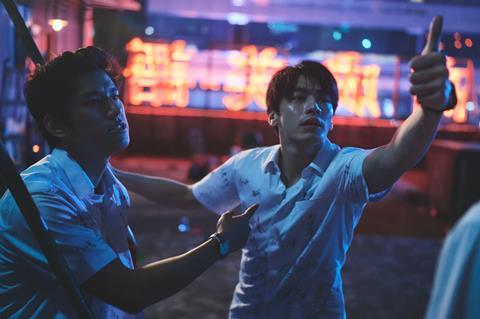
Celebrations will be on the cards at this year’s Bucheon International Fantastic Film Festival (BIFAN) in South Korea.
The 27th edition of Asia’s largest genre film festival, which runs from June 30 to July 9, coincides with Bucheon’s 50th anniversary as a city and an extended programme of events has been organised to mark the occasion.
The Carnival in July, first launched last year, will return on a larger scale with a parade, parties and events in the city’s shopping districts and hotels. Bifan has also programmed a selection of films that were released in 1973 including American Graffiti, Enter the Dragon, Flesh for Frankenstein and The Wicker Man: Final Cut.
The festival is also celebrating the success of features that first surfaced as part of its Network of Asian Fantastic Films (NAFF) project market and are now returning to Bifan after winning high profile awards. Among these is art horror Tiger Stripes, winner of the top prize at Cannes’ Critics Week, which will play in competition at BIFAN.
The debut feature of Malaysian director Amanda Nell Eu follows a teenage girl whose body begins to morph at an alarming rate as she learns to embrace her true self. It marks an ongoing shift in the genre films seen by BIFAN’s head programmer Ellen Y. D. Kim.
“I have seen the emergence of a lot of female filmmakers since around 2017, and more female characters in leading roles,” says Kim, taking a break from final preparations for the festival. “Previously, most genre movies were told from the male perspective and females were usually victims or the object of desire but now it’s totally changed.”
Kim, who oversees the Asian cinema selection as well as being head programmer, says she received around 300 feature film submissions from Asia alone, on a par with previous editions.

From these, a further trend that emerged was the reflection of our growing obsession with social media and mobile phones. “I have seen a lot of characters that are surrounded by cameras, or are more active in the digital realm,” says Kim. She highlights Sudeep Kanwal’s Privacy, centred on an surveillance operator in Mumbai; competition title Whale Bones from Japan’s Oe Takamasa, that involves a social media influencer and dating app; and Rock-A-Bye Baby from Vietnam’s Le Binh Giang, which follows an influencer who runs an internet channel that infiltrates crime scenes.
They are among 262 films from 51 countries, including 83 world premieres and 26 international premieres with a selection of titles also receiving online screenings on local OTT platform wavve.
Set as the opening film is Ari Aster’s Beau Is Afraid, starring Joaquin Phoenix, while the world premiere of Takashi Shimizu’s Sana will close the festival. Both directors are due to attend the festival, with Aster set to take part in a masterclass event.
A total of 10 films will compete in the Bucheon Choice: Features section while the Mad Max strand will include new works by genre film masters such as Quentin Dupieux with Smoking Causes Coughing and Álex de la Iglesia with Four’s a Crowd. The Adrenaline Drive section includes horror, hardcore and action genre movies such as Evil Dead Rise, Infinity Pool and Terrifier 2, while a special folk horror programme will examine recent trends in international horror cinema.
The festival will also spotlight Korean actor Choi Min Sik, with a selection of 10 films including Old Boy, Shiri, I Saw the Devil and two shorts that have been digitally restored. The actor will meet the audience during one of BIFAN’s Mega Talks.
J-horror icon Shimizu represents one of 80 guests in attendance from Japan, the country with the highest overseas representation at BIFAN, which will welcome more than 400 international guests – it’s biggest number to date. These will include filmmakers from Vietnam, Indonesia, Malaysia, Kazakhstan and Mongolia.
“The boom of Korean content in these Asian countries is bringing them here,” says Kim. “We have quite a limited budget for hospitality so many are bearing their own costs, which shows a lot of confidence in the festival.”
One to watch
Kim admits that “every year has been a challenge for the festival” since the Covid-19 outbreak in 2020, having adapted through the pandemic with two hybrid editions. “Last year, we recovered around 80-90% in terms of volume and scale. We are now expecting our biggest participation of foreign guests, especially from Asian countries.”
Of these, Kim identifies Taiwan as the one to watch. “Taiwan is blooming and will maybe be better than Korea in the future,” she says. “Their imagination and progressive thoughts in society is very healthy, and the eagerness to express their own individual style in Taiwan is very, very promising.”
Bifan signed a partnership with the Taiwan Creative Content Agency (TAICCA) at Hong Kong’s Filmart in March to foster increased industry collaboration between the two countries. The festival also has connections with the country’s Taipei Film Commission.
“We want strong partnerships with other Asian countries to establish a major base for pan-Asian co-operation,” adds Kim, highlighting its partnership with Japan’s Visual Industry Promotion Organization (VIPO) among others.
Looking back on her early days programming for BIFAN, which she first joined in 2001, she reflects that there are fewer star genre filmmakers than there used to be. “Back then, we have the joy of discovering exciting talent like Miike Takashi, Peter Jackson and Guillermo del Toro,” Kim recalls. “Now, I think it’s spread out and not condensed in one special filmmaker. Everybody has talent but nobody stands out. And if they do stand out, they immediately go to the mainstream.”
“We want to discover more new talent. People can now find films by famous directors anywhere at home so it’s our role to share unique movies from filmmakers new to the audience. We want to open the door to all forms of fantastic art.”

























No comments yet